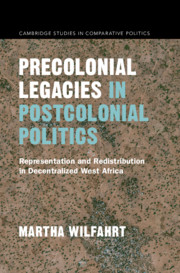 Precolonial Legacies in Postcolonial Politics
Precolonial Legacies in Postcolonial Politics Book contents
- Precolonial Legacies in Postcolonial Politics
- Cambridge Studies in Comparative Politics
- Precolonial Legacies in Postcolonial Politics
- Copyright page
- Contents
- Figures
- Tables
- Acknowledgments
- Introduction
- 1 A Theory of Institutional Congruence
- 2 Bringing Old States Back In
- 3 The Politics of Decentralization in Senegal
- 4 Political Narratives across Rural Senegal
- 5 Delivering Schools and Clinics in Rural Senegal
- 6 Congruence and Incongruence in Action
- 7 Decompressing Legacies of Public Goods Delivery, 1880–2012
- 8 Institutional Congruence beyond Senegal
- Conclusion
- Appendix
- Bibliography
- Index
- Cambridge Studies in Comparative Politics
3 - The Politics of Decentralization in Senegal
- Precolonial Legacies in Postcolonial Politics
- Cambridge Studies in Comparative Politics
- Precolonial Legacies in Postcolonial Politics
- Copyright page
- Contents
- Figures
- Tables
- Acknowledgments
- Introduction
- 1 A Theory of Institutional Congruence
- 2 Bringing Old States Back In
- 3 The Politics of Decentralization in Senegal
- 4 Political Narratives across Rural Senegal
- 5 Delivering Schools and Clinics in Rural Senegal
- 6 Congruence and Incongruence in Action
- 7 Decompressing Legacies of Public Goods Delivery, 1880–2012
- 8 Institutional Congruence beyond Senegal
- Conclusion
- Appendix
- Bibliography
- Index
- Cambridge Studies in Comparative Politics
Summary
Chapter 3 introduces Senegal’s decentralization reforms in depth, specifying the transfer of authority over basic social services to the local state in 1996. Because it is possible that the very process of delimiting decentralized units allowed more coherent communities to select into shared administrative divisions, I have to take into account the possibility that institutional congruence was not simply an outcome of the precolonial past, but available to any group able to influence boundary construction. Accordingly, the chapter details the politics of subnational boundary creation from the colonial onward. Employing archival and interview data, I demonstrate that decentralization and boundary delimitation were largely top-down processes, suggesting that the emergence of institutional congruence was not driven by endogenous, bottom-up demand.
- Type
- Chapter
- Information
- Precolonial Legacies in Postcolonial PoliticsRepresentation and Redistribution in Decentralized West Africa, pp. 74 - 94Publisher: Cambridge University PressPrint publication year: 2021
